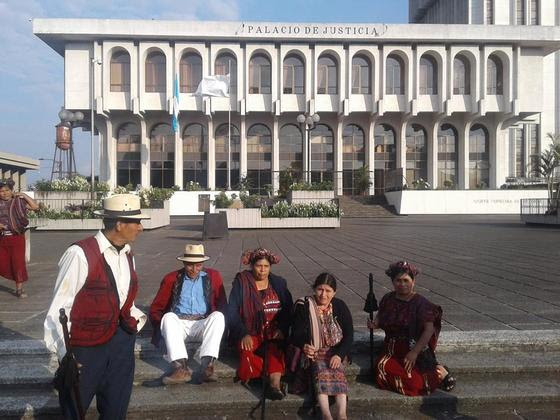What kinds of misunderstandings emerge in the context of criminal trials dealing with war crimes, crimes against humanity and genocide? What are the impacts of different linguistic and cultural practices on both the proceedings and the ways in which these proceedings are understood? While various scholars and observers have mapped parts of this vast terrain over the past two decades (see the work, among others, of Nancy Combs, Nigel Eltringham, Joshua Karton, Tim Kelsall, Jonneke Koomen and Catherine Namakula), several new commentaries featuring language and culture deserve a mention.
A recent article by anthropologist María Luz García highlights the difficulties that can arise when different discursive styles meet in the context of a courtroom. García carried out an in-depth study of how language was used during the 2013 domestic trial of former Guatemalan leader José Efraín Ríos Montt, who was charged with genocide of the Mayan Ixil indigenous population. García found that “the language ideologies governing discourse in Western courtrooms seek to divorce language use from cultural context through the proposition that content can be transferred from one language to another without loss of meaning.” In particular, she observed that the court was unable to recognize Ixil ways of speaking and therefore Ixil subjectivities. García notes that as a growing number of Mayan language speakers migrate to the United States, they increasingly find themselves enmeshed in legal processes where they continue to experience communication problems. (Pictured at right: Members of the Ixil community attending the Ríos Montt trial.)
Questions around language issues were also part of the recent visit by journalists from the Central African Republic (CAR) to the International Criminal Court (ICC), where they attended the confirmation of charges hearing for two Central African defendants, Alfred Yekatom and Patrice-Edouard Ngaïssona. Inès Laure Ngopot, special envoy to the ICC for Radio Ndeke Luka, described her experience in an interview with JusticeInfo. She and her colleagues were surprised to find that few documents relating to the case were available in French, despite CAR being a francophone country and French being an ICC working language. “We Central African journalists were very disappointed when some important documents for our articles were only in English,” Ngopot noted. “This has made our work very difficult.” She was also surprised when defense counsel objected to the journalists making a reportage in Sango because they did not understand what the journalists were saying. According to Ngopot, they seemed “unaware that this hearing concerns the Central African population, some of whom do not understand either English or French.”
A disconnect also emerged between the language of retributive justice and that of reconciliation. Ngopot explained, “We Central African journalists are aware of our role in relation to the public. As the country is in the post-conflict stage, we must avoid fueling hatred among our listeners or readers. During this hearing, the judges, the prosecutor’s office and the defence used a lot of harsh language, which could have a negative impact on the public. For example, they talked of ‘throat slitting’, of a ‘Muslim population that was massacred by Anti-Balaka’, a ‘religious’ conflict, etc. These are words that we Central African journalists cannot convey as such. We try to say it in a different way while keeping the idea.” In a recent Opinio Juris symposium devoted to Phil Clark’s Distant Justice: The Impact of the International Criminal Court on African Politics, the author makes a similar observation about the Court’s “negative impact on African societies in terms of jeopardising elections, peace negotiations, truth commissions, demobilisation programmes and community-based rituals.” Symposium participants Mark Drumbl and Kamari Clarke also offered thought-provoking comments about how the ICC is distant both emotionally and affectively from African societies, perspectives that do not align with the generally rational and Western-oriented culture of international criminal law.
Readers may learn more about the interrelation of language and culture at the ICC, including various effects of English-language dominance within the institution, in a soon-to-be published article by IJIN editor Leigh Swigart: “Now You See It, Now You Don’t: Culture at the International Criminal Court”. This nexus of issues in legal settings is the focus of Brandeis University’s Project on Language, Culture and Justice, currently under development.
